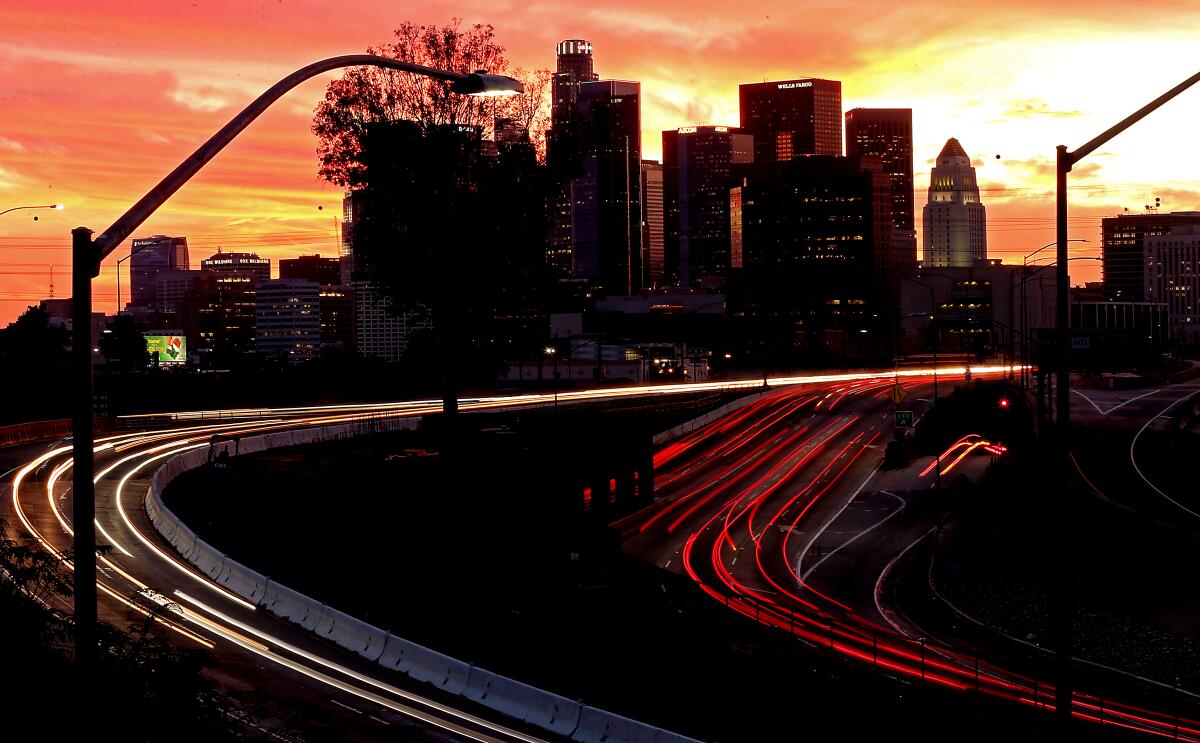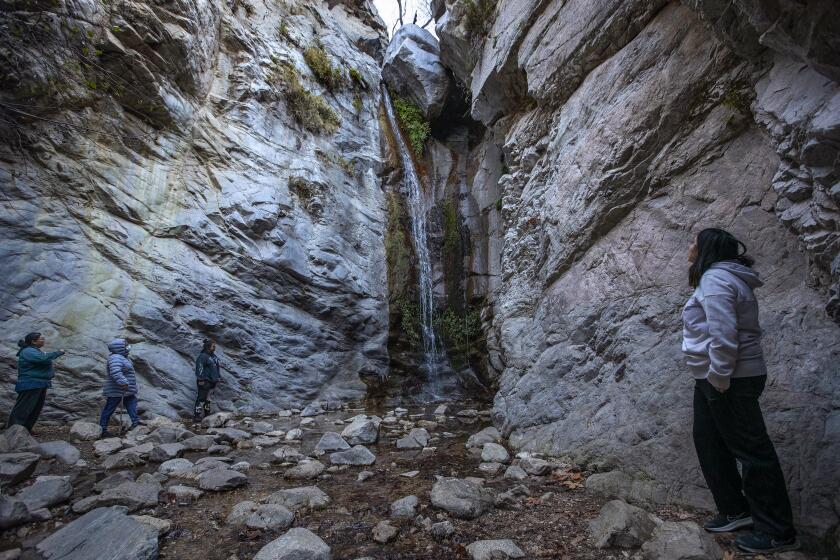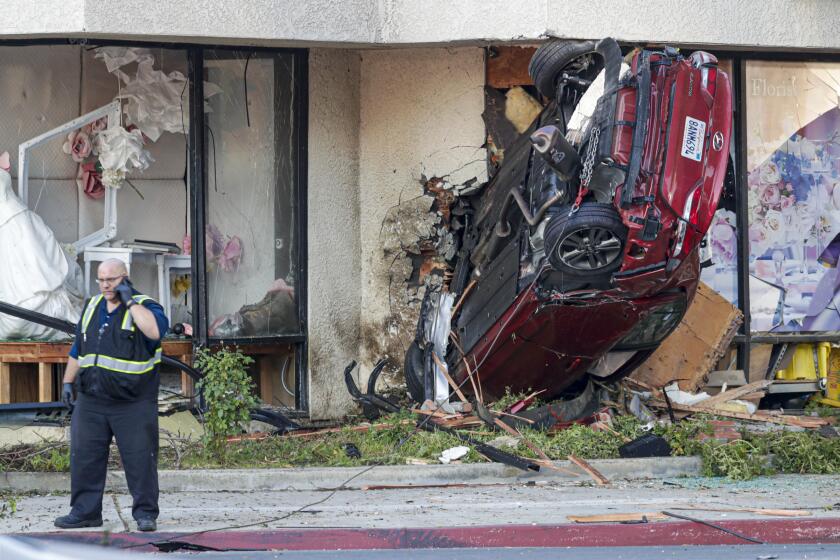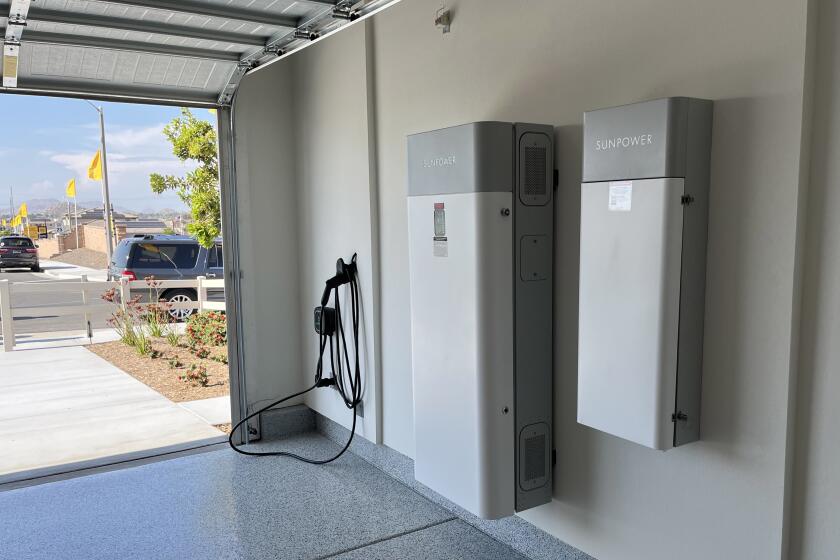Editorial: To reach climate goals, L.A. needs action on its Green New Deal — not excuses

- Share via
Los Angeles adopted an array of ambitious climate and transportation goals years ago under former Mayor Eric Garcetti, who had the relatively easy job of setting long-range targets knowing he would be out of office when they came due.
But now that some of those important deadlines are approaching, Mayor Karen Bass has the more difficult task of actually delivering on them. Already, there are signs of underperformance and delay.
There are three more proposals, including the Chuckwalla Mountains, to add to California’s national monuments. Biden should act on them before his first term is up.
Plans for more than $40 billion in rail, highway and mobility projects that were supposed to be finished in time for the 2028 Olympics have been scaled back dramatically after Metro was unable to line up even half of the funds needed. A City Controller’s report last fall found that Garcetti’s Green New Deal plan has not accomplished much, lacks meaningful metrics of progress and doesn’t amount to a “comprehensive and actionable set of steps to reduce greenhouse gas emissions.”
It’s disappointing that these lofty efforts to make Los Angeles an environmental and transit model have yielded so little.
In the latest instance of lowered expectations, Metro’s staff has for the second time in a year tried to delay the transit agency’s 2030 deadline to convert its entire 2,000-bus fleet to emissions-free electric models, without so much as a vote. In the seven years since Metro adopted the zero-emission policy, it has managed to order only 145 battery-electric buses and get just 50 of them delivered.
The automatic braking requirement for new cars is a milestone for U.S. road safety, on par with seat belts and airbags.
In a “receive and file” report that reads like a list of excuses, Metro staff blamed the slow progress on challenges with manufacturing, cost, range and charging and grid infrastructure. Electric buses can go about 150 miles before they need a recharge. But agency officials have done little to demonstrate that they are working with urgency to overcome these obstacles, presenting it instead as a foregone conclusion that the city won’t be able to reach the 2030 deadline until 2035.
Metro officials should be redoubling their efforts on climate and transportation solutions, not making excuses for why they can’t be met. It’s a bad look, especially as the city prepares to be in the global spotlight with the Olympics.
Fortunately, Bass and other Metro board members didn’t acquiesce to that defeatism. They directed staff to come back with a detailed plan of action to get a 100% zero-emission fleet “as soon as is possible and fiscally responsible.” The board is right to resist Metro staff’s efforts to dial back this key climate and air quality goal.
A proposal in the California Legislature would put a “green amendment” on the November ballot to add the rights to clean air, clean water and a healthy environment to the state constitution. The people should have their say.
“It’s imperative that this board make it clear that when this board sets goals, we don’t do so lightly, and we don’t easily accept backsliding,” City Councilmember Katy Yaroslavsky said at the board meeting last week. It’s good to hear at least some elected officials trying to stick to promises made by predecessors.
We hope the sorry progress on the shift to electric buses is not a sign of things to come on the other climate goals in L.A.’s “Green New Deal,” but it’s not looking promising.
Garcetti set a variety of near and long-term metrics for improving air quality, boosting renewable energy, electrifying vehicles and buildings and getting 70% of the city’s water from local sources by 2035 in an effort to confront “the greatest threat to our physical security and our health.” He also established the sweeping “28 by ‘28” plan six years ago to accelerate 28 significant transportation projects and complete them ahead of the 2028 summer Olympic Games.
The planet has recorded 10 straight months of record-high temperates. If world leaders need a jolt to get into crisis mode on climate change, this should be it.
Metro has replaced 10 of the projects on the list with less ambitious alternatives that can be finished in four years. For example, plans to build a light rail line in the eastern San Fernando Valley, the Sepulveda Transit Corridor linking the Valley with the Westside and an L.A. River bike path were downgraded to things such as bus-only lanes and upgrades to existing rail lines and stations.
These are necessary and virtuous goals, and achieving them would make the city a greener and healthier place to live. Leaders should learn from these setbacks in order to get ahead of other looming targets. They should retool the way agencies are held accountable for making progress and establish more aggressive interim targets that will put the city on the right path.
The end of Berkeley’s first-in-the-nation ban on gas hookups is a setback for the climate, but a small one. Electric appliances remain better and more efficient.
One way forward would be to codify them, just as California has done with some of its key climate goals, so that they become legally enforceable requirements and not mere aspirations to be shrugged off by finger-pointing bureaucrats. One proposal moving through City Hall would make L.A.’s climate policies more durable by incorporating them into the city’s General Plan.
The City Council has already turned some climate targets into requirements, like the goal of supplying 100% carbon-free electricity by 2035. But city leaders should be more proactive in making sure agencies are on track. To achieve its mandate, the Department of Water and Power has to line up the power purchasing agreements and transmission infrastructure necessary to double the city’s renewable energy portfolio in just a few years. Tougher scrutiny today could prevent future disappointment.
City leaders’ environmental promises are only growing in importance as Angelenos increasingly deal with deadly heat waves, destructive wildfires, polluted air and other effects of the climate crisis. As those impacts grow worse, we won’t look back charitably on government officials who offered excuses rather than action to clean the air and cut use of fossil fuels.
Bass and other elected officials need to understand that being a climate leader takes much more than just setting tough goals. It takes years of hard work, pushing bureaucracies to follow through with the urgency befitting of a crisis.
More to Read
A cure for the common opinion
Get thought-provoking perspectives with our weekly newsletter.
You may occasionally receive promotional content from the Los Angeles Times.















